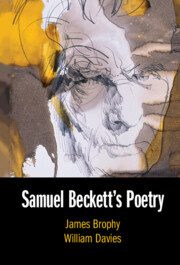Book contents
- Samuel Beckett’s Poetry
- Samuel Beckett’s Poetry
- Copyright page
- Contents
- Notes on Contributors
- Acknowledgements
- Abbreviations
- Introduction
- Chronology of Samuel Beckett’s Poetry
- Chapter 1 Weirdness and Dislocation in Beckett’s Early Poetry
- Chapter 2 Whole Fragments
- Chapter 3 Pre-echoing the Bones
- Chapter 4 ‘The Nucleus of a Living Poetic’
- Chapter 5 Beckett Growing Gnomic
- Chapter 6 Gender, Pronoun and Subject in ‘Poèmes 1937–1939’
- Chapter 7 The Missing Poème
- Chapter 8 Romanticism and Beckett’s Poetry
- 9 Romance under Strain in ‘Cascando’
- Chapter 10 Samuel Beckett’s Self-Translated Poems
- Chapter 11 Samuel Beckett’s Translations of Mexican Poetry
- Chapter 12 Beckett’s Poetry and the Radical Absence of the (War) Dead
- Chapter 13 Beckett’s Sound Sense
- Chapter 14 The Matter of Absence
- Chapter 15 ‘Mocked by a Tissue That May Not Serve’
- Chapter 16 Invoking Beckett
- Index
9 - Romance under Strain in ‘Cascando’
Published online by Cambridge University Press: 15 December 2022
- Samuel Beckett’s Poetry
- Samuel Beckett’s Poetry
- Copyright page
- Contents
- Notes on Contributors
- Acknowledgements
- Abbreviations
- Introduction
- Chronology of Samuel Beckett’s Poetry
- Chapter 1 Weirdness and Dislocation in Beckett’s Early Poetry
- Chapter 2 Whole Fragments
- Chapter 3 Pre-echoing the Bones
- Chapter 4 ‘The Nucleus of a Living Poetic’
- Chapter 5 Beckett Growing Gnomic
- Chapter 6 Gender, Pronoun and Subject in ‘Poèmes 1937–1939’
- Chapter 7 The Missing Poème
- Chapter 8 Romanticism and Beckett’s Poetry
- 9 Romance under Strain in ‘Cascando’
- Chapter 10 Samuel Beckett’s Self-Translated Poems
- Chapter 11 Samuel Beckett’s Translations of Mexican Poetry
- Chapter 12 Beckett’s Poetry and the Radical Absence of the (War) Dead
- Chapter 13 Beckett’s Sound Sense
- Chapter 14 The Matter of Absence
- Chapter 15 ‘Mocked by a Tissue That May Not Serve’
- Chapter 16 Invoking Beckett
- Index
Summary
Love too, often in my thoughts, when a boy, but not a great deal compared to other boys, it kept me awake I found.
(‘From An Abandoned Work’)1- Type
- Chapter
- Information
- Samuel Beckett's Poetry , pp. 142 - 156Publisher: Cambridge University PressPrint publication year: 2022



